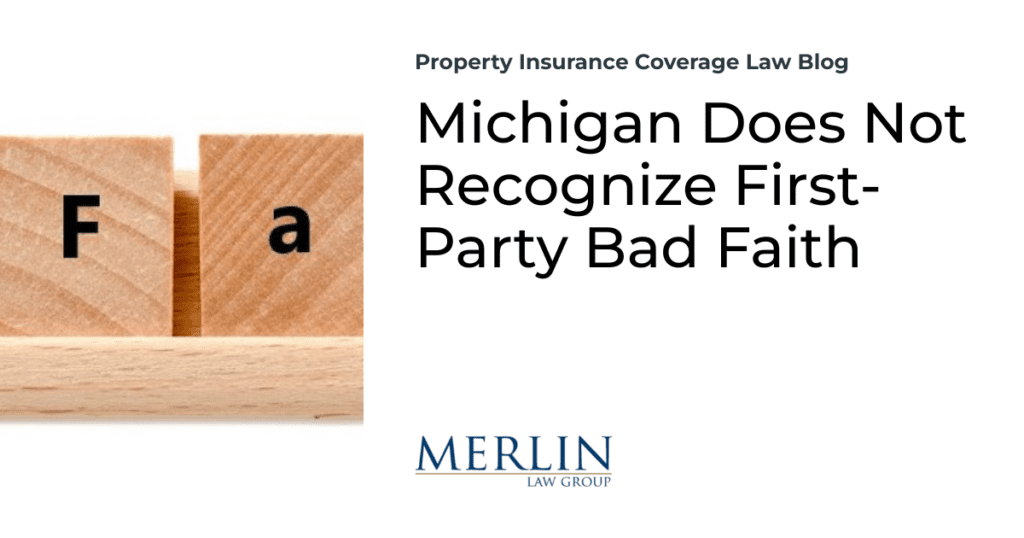Michigan Does Not Recognize First-Party Bad Faith

Michigan does not allow an action by a policyholder against a wrongful acting insurer’s failure to act in good faith. This has long been the law in Michigan, as noted in the fire damage case of Casey v Auto-Owners Insurance Company.1
The Casey court stated:
We conclude that amendment was futile because the Caseys merely sought to add a variety of theories that had no factual or legal basis, and that had essentially already been dismissed by the trial court. A plaintiff cannot maintain an action in tort for nonperformance of a contract. There must be a separate and distinct duty imposed by law. An alleged bad-faith breach of an insurance contract does not state an independent tort claim. Here, all the Caseys’ proposed claims stem from an alleged bad-faith breach of contract; therefore, those counts are futile as they fail to state an action independent from their breach of contract claim. Further, in breach of contract cases, the general rule is that exemplary damages are not recoverable absent allegation and proof of tortious conduct that is ‘independent of the breach.’ This is because ‘the plaintiff is adequately compensated’ for a breach of contract ‘when damages are awarded by reference only to the terms of the contract.’ The Caseys’ complaint does not state a tort claim independent from their breach of contract claim. Thus, they are not entitled to exemplary damages.
The title of an article in the Michigan Bar Journal, Michigan Recognizes Claims For Bad-Faith Insurance Practices But The Burden is High and There Are Many Limitations,2 seems to imply that Michigan recognizes first-party bad faith cases. It does not. Michigan law recognizes that some remote tort remedies may be brought, but even those are difficult to prove. The article correctly noted that:
[T]he legislature enacted the Uniform Trade Practices Act, which defines, prohibits, and penalizes insurance company conduct that amounts to bad faith. And although insureds may recover penalty interest under the act, the Michigan Court of Appeals found it did not create a separate private cause of action against insurers.
The article also pointed out a practice pointer when dealing with a bad-acting insurer in Michigan:
Other strategies make use of bad-faith conduct without bringing an independent claim. Take, for example, Isagholian v Transamerica Insurance Company which involved a plaintiff who sued his homeowners insurance company for breach of contract and a separate claim for ‘bad-faith dealings.’ The claim for bad-faith dealings was not actionable, but the Court permitted the jury to hear evidence of the insurer’s conduct, stating ‘[t]he good faith of both parties was integral to this action.’ Although the insured did not expand the damages available to him, he strengthened the claim that went to the jury.
The bottom line is that Michigan does not recognize a classic bad faith action involving a first-party insurance contract. It also does not allow for the recovery of attorneys fees by the prevailing policyholder.
Thought For The Day
A woman needs to combine niceness with insistence, a style that Mary Sue Coleman, president of the University of Michigan, calls relentlessly pleasant.
—Sheryl Sandberg
1 Casey v. Auto Owners Ins. Co., 273 Mich. App. 388, 401-402, 729 N.W.2d 277, 286-287 (Mich. Ct. App. 2006).
2 Kutinsky, Adam. Michigan Recognizes Claims for Bad-Faith Insurance Practices but the burden is high and there are many limitations. 98 MI Bar Jnl. 28 (2019).



